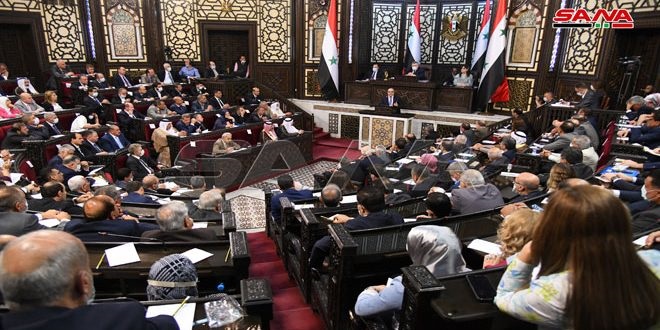In its sixth session of the first ordinary session of the third legislative term which was held on Sunday under the chairmanship of Hammouda Sabbagh, Speaker of the People’s Assembly, the People’s Assembly (Parliament ) discussed the performance of the Ministry of Economy and Foreign Trade and issues related to its work.
Regarding the recent fires that broke out in several governorates, Sabbagh underlined in his speech the necessity for the members of the People’s Assembly as representatives of citizens to be in close contact with the affected citizens to follow up on their demands and needs and work to alleviate their suffering as a result of this national and humanitarian catastrophe.
Sabbagh saluted the Syrian Arab Army, who played a pivotal role in extinguishing fires to protect the land and people, as well as the national defense, firefighters, union and popular cadres, volunteers and the media that conveyed the image from the affected provinces honestly and transparently.
For his part, Minister of Economy and Foreign Trade Dr. Muhammad Samer Al-Khalil reviewed the ministry’s work plan and what had been implemented, indicating that the trade balance deficit was reduced by increasing exports and reducing imports as much as possible in order to protect and stimulate domestic production and investment according to the available capabilities.
The volume of imports was reduced during the nine months of this year to 3 billion and 100 million Euros, compared with 4 billion Euros during the same period of the last year ( about 23 % distributed between the public and private sectors), Minister Al-Khalil said, adding that the ministry’s plan includes improvement of all measures related to import, export and securing raw materials to undermine the severity of the unilateral coercive economic measures imposed on Syria.
Regarding foreign economic relations, Minister Al-Khalil noted that several agreements have been signed with friendly countries such as the Russian Federation, that they will be discussed and developed during the meetings of the Syrian-Russian Joint Committee next November. He indicated that work is underway to establish a maritime transport company between Syria and the Republic of Crimea, and Syria will be granted privileges to import and export with the countries of the Eurasian Union, which include exemptions from customs duties reaching one hundred percent.
In their interventions, members of the PA called for reducing import licenses granted to traders, setting up mechanisms to support the export sector and shipping systems, studying the needs of the internal market before exporting materials, supporting the import substitution project, granting import licenses for pharmaceutical industries, developing free zones, and rehabilitating the free zone in Aleppo.
Some members called for updating the investment law, creating an appropriate legal environment for the reconstruction phase, encouraging national investment capital, developing new mechanisms to attract Syrian migrant funds, and activating the ministry’s website.
The members highlighted the importance of activating the role of the General Organization for Foreign Trade and importing fertilizers and not allowing the export of milk, cheese, vegetables, fruits, fodder, oils and citrus fruits.
In another context, a number of members called for the opening of a donation fund for those affected in the areas that witnessed fires in the governorates of Lattakia, Tartous and Homs.
In his response to the interventions, Minister Al-Khalil indicated that the import structure in Syria is considered ideal, as unnecessary materials have been excluded from it and that there are special import lists for both the public and private sectors.
The minister pointed out that the volume of exports increased by 20 % in 2019 and rose during the first nine months of this year by 44 %, pointing to the impact of economic sanctions on the process of importing basic and primary materials.
With regard to the issue of the free zone in Aleppo, Minister Al-Khalil pointed out that there is a project to be submitted for participation while preserving the rights of the state, as it will be under the management of the General Company for Free Markets.
Inas Abdulkareem

